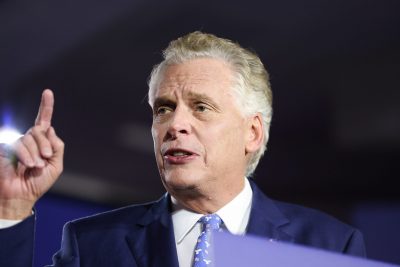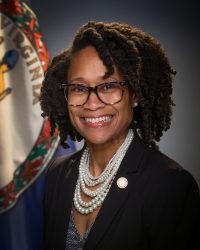After a nine-figure avalanche of TV commercials, slick mailers and high-powered political rallies, The Associated Press declared Republican candidate Glenn Youngkin as Virginia’s 74th governor Wednesday, leading a Republican sweep of statewide offices and the party’s possible regain of control in the House of Delegates.
A political newcomer and former co-CEO of Washington, D.C.-based private equity firm The Carlyle Group, Youngkin held a nearly three-point lead just after midnight over former Gov. Terry McAuliffe, his Democratic opponent. The AP called the race for Youngkin at 12:40 a.m. Wednesday.
With 99.8% of Election Day votes and 91.9% of early votes counted, Youngkin had 51.01% of the vote, compared with 48.29% for McAuliffe.
Taking the stage to the guitar chords of the ’70s rock gospel hit “Spirit in the Sky,” a jubilant Youngkin promised to eliminate Virginia’s grocery tax, double residents’ standard tax deduction, pump more funding into law enforcement and allow charter schools across the commonwealth.
“We will not be a commonwealth of low expectations,” Youngkin said. “We will be a commonwealth of high expectations. Friends, all of that has changed tonight.”
He did not refer to his opponent at all during his 12-minute victory speech.
McAuliffe conceded the race in a statement Wednesday morning, congratulating Youngkin on his win. “While last night we came up short, I am proud that we spent this campaign fighting for the values we so deeply believe in. We must protect Virginia’s great public schools and invest in our students. We must protect affordable health care coverage, raise the minimum wage faster and expand paid leave so working families have a fighting shot.”
He added, in an apparent reference to Trump-era Republicanism, “above all else, we must protect our democracy. While there will be setbacks along the way, I am confident that the longterm path of Virginia is toward inclusion, openness and tolerance for all.”
Gov. Ralph Northam issued a statement Wednesday congratulating Youngkin, thanking the state’s department of elections, registrars and poll workers for a “free and fair election with integrity.” He added, “Over the past four years, Virginia has accomplished something unique in America — delivering the most progressive agenda in the country, while also preserving traditions of fiscal responsibility and economic stewardship. Most importantly, we have made Virginia a more welcoming, open, and inclusive commonwealth. Virginians expect this critical work to continue.”
The down-ticket races also came down to the wire, although Republican lieutenant governor candidate Winsome Sears held a 51.4% lead over Democratic Del. Hala Ayala’s 48.5%, while Republican Del. Jason Miyares had 51.1% of the attorney general vote count, over 48.85% for Democratic incumbent Attorney General Mark Herring.
On Wednesday morning the AP called those races for Miyares, who will be the first Cuban American to hold statewide office, and Sears, the first Black woman to do so. Republicans appeared headed for control of the House of Delegates, although the AP said Wednesday morning several races were too close to call.
“I think they are excited about Youngkin,” Quentin Kidd, director of the Wason Center for Public Policy at Christopher Newport University, said of Republican voters. “I think they were excited by the idea that a candidate ran as effective a campaign as Youngkin ran, spoke about the issues that they cared about. Critical race theory embodied a lot of the issues that Republican voters were frustrated about related to education and the schools being shut down and all the vaccines and all that kind of stuff. Youngkin was able to energize voters — more than voters were excited about Youngkin. Let’s be honest, Youngkin was an unknown quantity until mid-summer when he spent millions of dollars to introduce himself.”
In the most expensive gubernatorial race in Virginia’s history, the two major-party candidates raised more than $117 million through Oct. 21, compared to the previous record of $64.7 million raised by Northam and his Republican opponent, Ed Gillespie. Youngkin poured at least $20 million of his own fortune into his campaign, including $3.5 million during the first three weeks of October.
McAuliffe made an appearance just after 10 p.m. Tuesday but did not concede the race, instead saying that he would “continue the fight.” He thanked supporters and stood flanked by family members and Gov. Ralph Northam. There was a delay in calling the race even as Youngkin continued to hold the lead late Tuesday, and according to the Virginia Public Access Project, as many as 30,000 absentee votes may remain to be tallied in Fairfax County.
For a state that appeared to be growing bluer in recent years, the election results were a rebuke for state Democrats after they regained political control of state government just two years earlier. Republicans gained six seats in the House of Delegates, giving the party a 51-seat majority over Democrats, which retained 49 seats. Now Democrats only hold a majority in the Virginia State Senate, which was not up for election this year.
The gubernatorial race received heavy national media attention, as it is considered a predictor for the 2022 midterm elections. President Joe Biden has seen his approval rating sink in recent months as the COVID-19 pandemic lingers and his trillion-dollar infrastructure package stalls in Congress. In Virginia, where he won the 2020 presidential election by 10 points, Biden’s approval rating stood at 45%, with 48% of respondents disapproving of his performance in an Oct. 7 poll of Virginia voters by Emerson College and Nexstar Media Group.

McAuliffe heavily relied on his previous stint as governor during much of the general campaign, touting his economic development triumphs and promising to build on the state’s two-year status as the nation’s top state for business, as selected by CNBC. McAuliffe also consistently invoked the specter of former President Donald Trump, trying to link Youngkin to the ex-president — an attempt to scare off suburban voters from the GOP candidate. Although Trump endorsed Youngkin and stated his support for the candidate in televised rallies, Youngkin mostly steered clear of the former president during the race.
In the campaign’s final weeks, as polls indicated a tighter race, McAuliffe called on high-profile Democrats — President Biden, former President Barack Obama and Vice President Kamala Harris — to campaign on his behalf. Even Grammy-winning superstar Pharrell Williams made a last-minute pitch in Norfolk last week for McAuliffe, accompanying Harris.
And although Youngkin entered the race as a relatively unknown businessman who amassed a multimillion fortune as co-CEO of The Carlyle Group, he pivoted his campaigning from a focus on economic development and job creation in earlier months to culture war messaging about critical race theory and parents’ say over their children’s educations — a move McAuliffe called a “racist dog whistle” on a “Meet the Press” appearance.
Some political soothsayers said early this week that the race appeared to be breaking in the Republicans’ favor. Although the University of Virginia Center for Politics hedged its bets a bit, it ultimately rated the governor’s race as leaning Republican on Monday, a shift from “leans Democratic.”
“There’s a point in every election cycle where decided voters decide to show up and vote, and undecided voters decide which way they’re going to vote,” Chris Saxman, a former Republican delegate who is now executive director of Virginia FREE, a nonpartisan, business-focused political group, said Tuesday before polling stations closed. “It creates a break and it’s hard to turn that momentum around and then it accelerates. And I think that’s what you’re seeing right now in Virginia.”
Spurred by conservative parents’ occasionally unruly protests at school board meetings — including a Loudoun County meeting that led to a man’s arrest — Youngkin seized on McAuliffe’s rhetorical gaffe during a late September debate in which McAuliffe said, “I don’t think parents should be telling schools what they should teach.”
Soon after that, Youngkin’s team deployed the McAuliffe quote in a campaign ad aired many times during October, followed by a commercial featuring a Fairfax County woman who said her son was given “nightmares” by reading Toni Morrison’s Pulitzer Prize-winning novel “Beloved,” which was assigned in his AP English class several years ago. The book deals with the story of a woman who kills her 2-year-old daughter to save her from enslavement in the 19th-century South, and includes scenes of rape and other violence.
Later reporting by The Washington Post noted that the woman, Laura Murphy, advocated for a bill passed by the General Assembly in 2016 that gave parents the right to opt out their children from reading sexually explicit books — a bill vetoed by then-Gov. McAuliffe.
“Youngkin was a very effective first-time candidate,” said Stephen Farnsworth, University of Mary Washington professor of political science and director of the Center for Leadership and Media Studies. “He was able to capitalize McAuliffe’s education misstep during the debate. Youngkin was also very effective at navigating the challenge of Trump. He was able to keep Trump supporters onside during the campaign, and also kept enough daylight between himself and the former president so that he could win over suburban Republicans who backed Romney but didn’t like Trump much.”
Another issue for McAuliffe: low excitement among Democratic voters. Although the former governor was the clear winner of the June Democratic primary, out-fundraising and vaulting over more diverse and lesser-known candidates, younger and more progressive voters expressed dismay over his selection as the party’s nominee — a moderate-leaning, 60-something white man. Among his primary challengers were state Sen. Jennifer McClellan and former Del. Jennifer Carroll Foy, either of whom could have been Virginia’s first female governor and the first Black governor of Virginia since Gov. L. Douglas Wilder was elected in 1989.
In the general election, third-party candidate Princess Blanding, a progressive who ran primarily on a platform of criminal justice reform, was polling at about 1% going into Election Day — enough to worry Democrats in the tight gubernatorial race. Her brother, high school biology teacher Marcus-David Peters, was shot and killed by a Richmond police officer in 2018 while Peters was suffering a mental health crisis.
“In many ways, politics as usual is not the best route forward for the Democrats,” Amanda Wintersieck, an assistant professor of political science at Virginia Commonwealth University, said Tuesday before election results came in. “Princess Blanding is polling at 1 to 4%. She’s present in this election because the progressive element of the Democratic Party and the minority element … don’t know that Democratic politics are meeting their needs.”
Ambiguously funded political PACs also funded attack ads and campaigns against both major party candidates. Some of the worst mudslinging came from out-of-state groups, including the anti-Trump Lincoln Project, which acknowledged it was behind a controversial protest in Charlottesville last week during which a small group of white-shirt-and-khaki-clad people carrying tiki torches stood in pouring rain in front of a Youngkin campaign bus. It was a callback to the far right and white supremacist “Unite the Right” protesters who invaded the University of Virginia and downtown Charlottesville in August 2017, injuring several people and killing one woman when a man drove his car into a crowd downtown.
The campaign stunt, which aimed to tie Youngkin to the alt-right movement, was held the same week as jury selection for a civil trial against organizers of the Unite the Right rally in Charlottesville’s federal court. Many in Virginia condemned the protest, saying it made light of a traumatic experience.
“Outside spending in this race is at an all-time high,” Wintersieck added. “We’re seeing a massive influx of money from non-Virginians. It’s changing the dynamics of the race, and it’s changing the issues that are being talked about, and it’s drawn the nation’s attention to this race.”
Virginia Business Editor Richard Foster and Associate Editor Robyn Sidersky contributed to this report.


